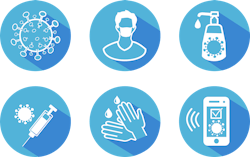The World Health Organization (WHO) has released a technical brief on Omicron, a highly divergent SARS-CoV-2 variant with a high number of mutations, saying that the risk of spread around the world is “very high.”
Meanwhile, at least 17 countries have reported confirmed cases of Omicron, mostly in Europe, according to a news report from the Center for Infectious Disease Research and Policy (CIDRAP) at the University of Minnesota.
The WHO. which has classified Omicron as a variant of concern, said some of the mutations, including 26‐32 in the spike, may be associated with immune escape potential and higher transmissibility.
As a result, the WHO urged countries to undertake the following efforts:
- Enhance surveillance and sequencing efforts to better understand circulating SARS‐CoV‐2 variants, including Omicron. Where capacity exists, perform field investigations and laboratory assessments to improve an understanding of the characteristics of Omicron, including community-based testing.
- As S gene target failure (SGTF) from a widely used PCR test (ThermoFisher TaqPath) is indicated for Omicron, the SGTF can be used as the marker for this variant, which may lead to efficient detection of Omicron.
- Report initial cases/clusters associated with Omicron infection to WHO through the IHR mechanism Thereafter, report (publicly or through IHR) the relative prevalence of Omicron as the number of sequences of Omicron (numerator) divided by the total number of sequences generated through routine surveillance (denominator) and/or, where available, number of SGTF out of number tested, in the same unit of time, according to sampling date
- Accelerate COVID‐19 vaccination coverage as rapidly as possible, especially among populations designated as high priority who remain unvaccinated or are not yet fully vaccinated.
- Use a risk‐based approach to adjust international travel measures in a timely manner.
- Emphasize mitigation measures, such as mask wearing and social distancing. Contact tracing of COVID‐19 cases to interrupt chains of transmission of SARS‐CoV‐2 is strongly advised.
- Ensure early warning systems are in place to inform efficient adjustment of public health and social measures.
- Ensure mitigation plans are in place to maintain essential health services and necessary healthcare resources are in place to respond to potential surges.
- Communicate evidence‐based information on the Omicron and other circulating variants and potential implication for the public in a timely and transparent manner, including what is known, what is unknown and what is being done by responsible authorities.
About the Author
Sign up for our eNewsletters
Get the latest news and updates

